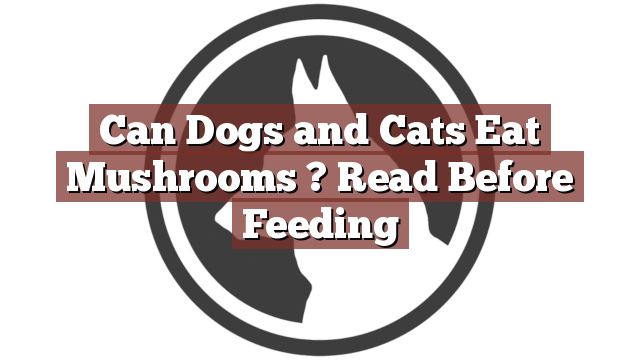Understanding Your Dog’s Dietary Needs
As responsible pet owners, it is vital for us to understand the dietary needs of our beloved dogs. Dogs are primarily carnivores, meaning their bodies are adapted to derive essential nutrients from animal sources. While they can consume certain fruits and vegetables in moderation, it’s crucial to be aware of the foods that can have adverse effects on their health. One such food that often sparks curiosity is mushrooms. So, can dogs and cats eat mushrooms? Let’s explore the answer to this question and the potential risks and benefits associated with feeding them mushrooms.
Can Dogs and Cats Eat Mushrooms? Read Before Feeding
Can dogs eat mushrooms? No, dogs should not be fed mushrooms. While some varieties of mushrooms are safe for human consumption, it is important to note that many common mushrooms can be toxic to dogs and cats. Certain species of mushrooms contain toxins that can cause a range of symptoms, including vomiting, diarrhea, abdominal pain, drooling, liver damage, kidney failure, seizures, and even death. Therefore, it is best to err on the side of caution and avoid feeding mushrooms to your furry friends.
It’s worth mentioning that cats are typically less likely to be intrigued by mushrooms compared to dogs. Nevertheless, the same caution should be exercised when it comes to introducing mushrooms into a cat’s diet. As with any unfamiliar food, it’s always advisable to consult your veterinarian before offering mushrooms to your pets.
Pros and Cons of Feeding Mushrooms to Dogs and Cats
While mushrooms can provide certain nutritional benefits to humans, such as being low in calories and high in fiber, these advantages may not be applicable to dogs and cats. In fact, the risks associated with mushroom consumption by pets outweigh any potential benefits. Some mushrooms, such as the Amanita species, can be highly toxic and cause severe illness or even death. The effects of mushroom poisoning can vary depending on the type of mushroom ingested and the size and overall health of the animal. It is essential to recognize that even small amounts of certain toxic mushrooms can have devastating consequences for your pets.
On the other hand, there are a few specialty pet food brands that incorporate mushrooms into their recipes, but these are carefully selected and processed to ensure they are safe for consumption. If you are considering feeding your pet a diet that includes mushrooms, always choose commercial pet foods that are specifically formulated and approved by veterinarians to meet the unique nutritional needs of dogs and cats.
In Conclusion: Weighing the Risks and Benefits of Mushroom Consumption by Dogs and Cats
Can dogs and cats eat mushrooms? The answer is a resounding no. While mushrooms are a staple in human diets and can offer various health benefits, they are not suitable for our canine and feline companions. The potential risks of mushroom toxicity far outweigh any potential benefits, and it is crucial to prioritize the well-being and safety of our pets. If you suspect your pet has ingested mushrooms or any other toxic substance, contact your veterinarian immediately for guidance and assistance. Remember, a well-balanced diet specifically designed for dogs and cats is the key to their overall health and longevity.
Thank you for taking the time to read through our exploration of [page_title]. As every dog lover knows, our furry friends have unique dietary needs and responses, often varying from one canine to another. This is why it's paramount to approach any changes in their diet with caution and knowledge.
Before introducing any new treats or making alterations to your dog's diet based on our insights, it's crucial to consult with a veterinarian about [page_title]. Their expertise ensures that the choices you make are well-suited to your particular pet's health and well-being.
Even seemingly harmless foods can sometimes lead to allergic reactions or digestive issues, which is why monitoring your dog after introducing any new food item is essential.
The content provided here on [page_title] is crafted with care, thorough research, and a genuine love for dogs. Nevertheless, it serves as a general guideline and should not be considered a substitute for professional veterinary advice.
Always prioritize the expert insights of your veterinarian, and remember that the health and happiness of your furry companion come first.
May your journey with your pet continue to be filled with joy, love, and safe culinary adventures. Happy reading, and even happier snacking for your canine friend!

